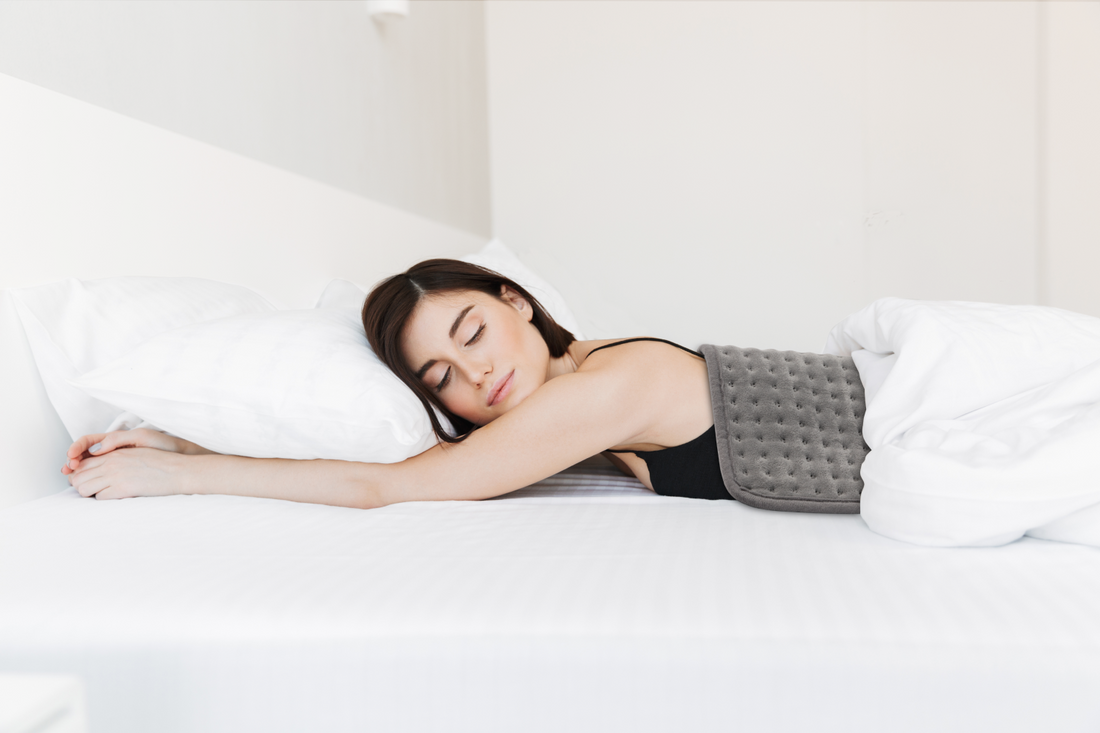Do you want to know the symptoms, causes, and possible remedies for a dry throat at night? Learn more in this guide.
Waking up with a dry throat can be uncomfortable and unpleasant. You may also notice that dryness in the throat can interfere with your precious sleep. Managing your dry throat pain can help you to get all of your zzzs and wake up feeling fresh and rested, instead of dry and uncomfortable.
Suffering from a dry throat at night is more common in the winter months, when you may be more prone to respiratory illnesses. Having a dry throat at night might also indicate a more serious underlying cause.
Keep reading to learn all about what causes a dry throat at night. This guide will cover the best habits, remedies, and essential oils to use to help you to mitigate the symptoms of a dry throat at night.
Symptoms Of A Dry Throat At Night
Other than waking up with a dry throat, here are some of the other symptoms that could indicate that you are suffering from a dry throat when you sleep.
Mouth Soreness
If you are suffering from a dry throat at night, you may wake up with either soreness or a sticky feeling in your mouth. This may also feel as though you are extremely dehydrated, and you may feel the need to drink water and alleviate the mouth's soreness.
Halitosis
Halitosis is another symptom associated with a dry throat at night. Halitosis can be highly embarrassing. When you have a dry throat at night, your salivary glands cannot produce enough liquid to clear the bacteria that has built up in your mouth and throat, leading to halitosis.
Cracked Lips
If your mouth and throat are dry throughout the night, then it is likely that your lips will become dry and cracked too. Since dryness in the mouth and throat is caused by a lack of saliva throughout the night, there will also be less saliva present to moisten your lips throughout the night and prevent them from becoming dry and cracked.
Gingivitis
When your mouth isn't producing enough saliva throughout the night to keep your mouth and throat free from bacteria, this can lead to a build-up of plaque in the mouth, eventually leading to gingivitis. If you are suffering from gingivitis due to a dry throat at night, you must take steps to treat and resolve the issue before it develops into periodontitis.
Differences In Taste
When bacteria build up in the mouth, this can affect how your food tastes. If you're suffering from a dry throat at night, you may notice that your food tastes different or does not have the same vibrant flavor as before.
Causes Of A Dry Throat At Night
Now that we have covered some of the symptoms commonly associated with a dry throat, let's look at the leading causes of a dry mouth and throat. To relieve symptoms of a dry mouth and throat, it's essential to understand the root cause.
Dehydration
If you don't drink water regularly, this will inhibit your saliva production, leading to a dry mouth and dry throat. Drinking fluids is essential for our overall health and can be beneficial for our energy levels throughout the day, so drink water regularly, regardless of whether you're suffering from a dry mouth at night or not.
Mouth Breathing Or Breathing Dry Air
Mouth breathing and breathing dry air dry out of the mouth as we sleep can cause a dry throat at night. Mouth breathing is quite challenging to eliminate, but by adding moisture to the air or using a dehumidifier, you can mitigate the dryness in your mouth and throat that is caused by mouth breathing and dry air.
Medication
Several medications can cause a dry mouth at night. Some of the drugs that list a dry mouth as a side effect include:
- Benzodiazepines - if you take benzodiazepines to help you sleep or treat anxiety, this could cause a dry throat.
- Antidepressants.
- Antipsychotics.
- Alzheimer's medications.
- Antihistamines.
- Blood pressure and heart medications.
- Decongestants.
- Diuretics.
- Analgesics.
- Stimulants.
You should look into medically reviewed products to ensure that they could not be the ultimate cause of your dry or sore throat.
Gastroesophageal Reflux Disease (GERD)
Gastroesophageal reflux disease, or GERD, is a condition that affects the digestive system, specifically the ring of muscle between the esophagus and the stomach. The stomach acid from your stomach rises into the throat and causes damage to your esophagus. The backwash (acid reflux) is too corrosive to be exposed to the sensitive tissue in your esophagus. You may notice dryness in the mouth and throat, chest pain, and difficulty swallowing.
Sleep Disorders (i.e. Sleep Apnea)
Sleep apnea is a sleep disorder that causes your breathing to stop and start throughout the night. The most common type of sleep apnea is obstructive sleep apnea, categorized as gasping or choking throughout the night and snoring. If you are mouth breathing and having breathing difficulties during the night, your throat can become dry.
Diabetes
Xerostomia is a condition where the salivary glands in the mouth are not producing enough saliva. Xerostomia is a common symptom associated with diabetes. If you have diabetes and suffer from a dry throat, this could be due to diabetes-related xerostomia.
Pollution And Allergies
Allergies occur when your throat responds to harmless substances, such as pollen for hay fever sufferers, and miscategorizes them as harmful substances. This triggers a response in your immune system, which leads to an allergic reaction. Your immune system is responsible for causing the dryness in your throat. Allergies such as hay fever can also cause a reaction in the body, called allergic rhinitis, which refers to dryness and irritation in the nose. To mitigate hay fever symptoms, you can take antihistamines, which contain a chemical called histamine, which will soothe the allergic response in your immune system.
Smoking
When you smoke or vape, you inhale air that will dry out your throat. Vaping and smoking before you sleep can exacerbate your dry mouth and throat symptoms at night.
Any irritation in the throat caused by vaping will be due to a chemical called propylene glycol, or PG, present in some e-liquids. This chemical is safe but can cause damage to the sensitive tissue in your throat.
If you are a smoker, the heat from the smoke you inhale will heat the saliva in your mouth and cause your mouth to become dehydrated, as more saliva will be lost when you exhale.
Viral Infections
Viral infections, such as strep throat or a sore throat, can lead to dryness in the throat. When you have a throat infection, the bacteria in your throat will cause your throat passage to become irritated, scratchy, and dry. A scratchy throat characterizes strep throat, so if you're experiencing a scratchy throat that worsens at night, this could be due to a strep throat infection.
Tonsillitis
A dry throat can be a symptom of tonsillitis. Tonsillitis is a condition that causes inflammation in the tonsils, which are two oval-shaped pads at the back of your throat. If you suffer from tonsillitis frequently, you may be able to have your tonsils removed to prevent them from reoccurring. If you have a dry throat and fever, you could be suffering from tonsillitis.
Mononucleosis
Mononucleosis is a viral throat infection sometimes known as the 'kissing disease', as you can pass it on through kisses. Mononucleosis can cause swelling in the tonsils, fatigue, a sore throat, and a fever. If you suffer from any of these symptoms, your dry throat could be caused by mono.
Talking Or Shouting Excessively
If you are a singer, performer, drill sergeant, or teacher, you will likely talk, sing, and shout for long periods. The strain that this puts on your throat, and the saliva you use from mouth breathing, can inhibit your ability to keep your throat moist. If your job requires you to talk, shout, or sing excessively for long periods, you will benefit from undergoing periods of vocal rest.
How To Deal With A Dry Throat At Night
Here's how you can deal with your dry throat at night and achieve a better night’s sleep, reduce symptoms of obstructive sleep apnea, and reduce allergy symptoms.
Avoid Sugar, Alcohol, And Caffeine
Sugar, alcohol, and caffeine can contribute to dehydration. These substances are diuretics, which promote the expulsion of a person's bodily fluids. If you think your dry throat is caused by dehydration, it's best to avoid these foods and substances.
Stay Hydrated
Staying hydrated has numerous benefits for your overall health. If you drink water regularly, this can help to reduce symptoms of a dry mouth and sore throat, but it can also help you feel more energized throughout the day and improve your sleep quality. If you are dehydrated, you will feel groggy, and you may have a dry mouth and sore throat, so drinking plenty of water is the best solution for your overall good health.
Monitor Your Sleep
If you suspect that you are suffering from sleep apnea, a great way to figure this out is to monitor your sleep. You can set up a video recorder or use a sleep recorder app to find out if you are breathing through your mouth, snoring, or choking while you sleep.
Use A Humidifier
If you're a mouth breather, using a humidifier is one of the best ways to add moisture to the air and stop dry air from drying out your mouth during the night. If you sleep with your mouth open, a humidifier or diffuser can be an excellent way to treat sleep apnea and dryness in the mouth.
Home Remedies
If you're thinking of using a diffuser to provide more moisture in the air while you sleep, why not try essential oils? You can use eucalyptus essential oil to help clear any congestion in your throat and the water from the diffuser will keep your throat moist. This solution works well for dry throats that are caused by any condition and it can provide you with some much-needed relief.
Conclusion
If you have a dry throat in the morning, this can be caused by several things. To figure out the best way to treat your parched throat, you must first determine the cause, whether it’s from medication, sleep apnea, or dehydration. Regardless of the cause, you can use a humidifier or diffuser to add moisture to the air and mitigate the symptoms of dryness of the throat in the morning.
At BluZen, we empower people to take their health into their own hands and find holistic and natural ways to manage both their mental and physical health. We offer high-quality essential oils, diffusers, and sleep products to help our customers achieve wellness.

